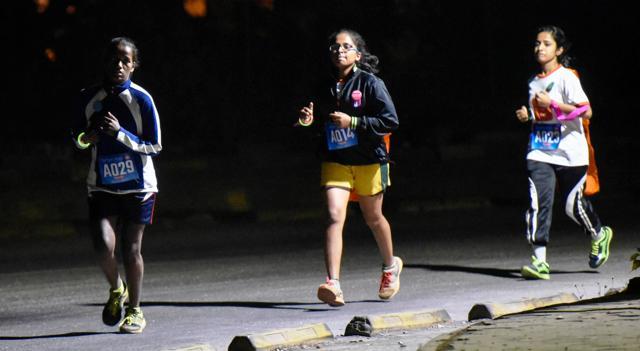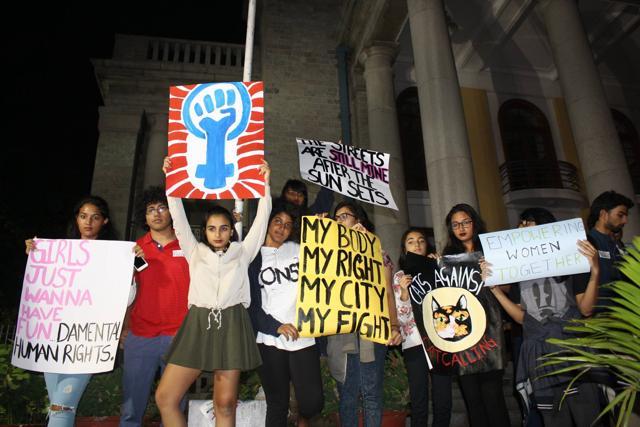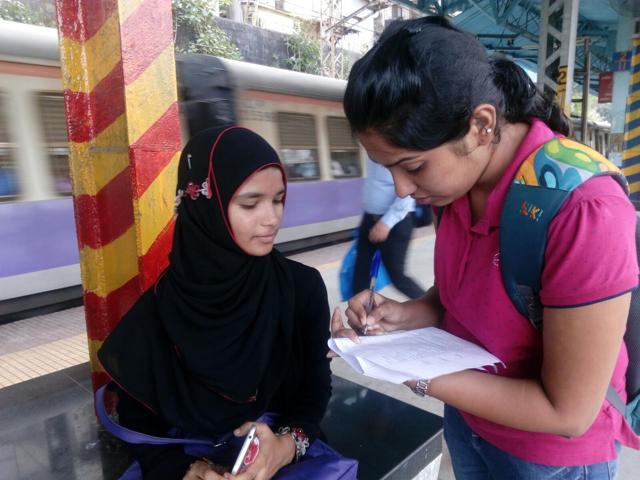Beyond the hashtags: How online activism led to women reclaiming the street
A generation accused of only raging on social media is taking to the streets. Bengaluru might be the trigger, but the midnight runs and post-dark park visits are part of something bigger
A generation accused of only raging on social media is taking to the streets. Bengaluru might be the trigger, but the midnight runs and post-dark park visits are part of something bigger.

We’re at Bandra-Kurla Complex (BKC) at 11pm. Till evening, this area is buzzing, thanks to the numerous corporate offices in BKC. But now, the streets are deserted, vehicles are few and far between. In one half of an open pay-and-park space, there are bright lights, a makeshift stage, and a small crowd. Most are dressed in workout outfits, with neon vests and marathon bibs. While those present are mostly women, there are a few men as well. They’re here for a midnight run (7km) to draw attention to the issue of women’s safety.

“I’m here to express solidarity with the women of Bengaluru,” says Sangeeta Rege, 35, a professional at city-based health research centre, CEHAT.
READ MORE: Gender Bender: How India discovered role reversal through pop culture
After the accusation of mass molestation in Bengaluru on New Year’s Eve, there has been a wave of public outrage. Sexist reactions by public leaders that followed did nothing to help. Across the country, the movement by women to reclaim the street took on greater urgency.

Essentially, the ‘reclaim the night’ or ‘take back the night’ movement fights for a woman’s right to be out and about post sunset. The first few night marches were held in America in the late 1970s — after the murder of a woman walking home alone in Philadelphia, USA, and have since been held across the globe. Similarly, ‘reclaim the street’ asserts a woman’s right to occupy public spaces just as much as men, at any hour. At times, the proposed agenda is to read a book, or nap at a park. But, largely, it’s just to gather without an aim, without an express purpose.
Today, be it the Arab Spring or the revival of book clubs in Mumbai, social media plays an important role. Here, too, it connects feminist groups across India and helps spread the word about an upcoming meet or protest march. For a generation that often gets accused of being armchair Twitter activists, millennials have taken to the street to stand for what they rage about online. So, #IWillGoOut and #INeverAskForIt actually turn to offline gatherings.
Call to action
Over the past couple of weeks, the movement has gathered momentum. Not just the New Year’s Eve incident, the subsequent CCTV footage of a woman being assaulted on a Bengaluru street and the recent molestation accusation by a Ladakhi medical student against her professor in Kashmir were tipping points. Bengaluru, especially, saw women and men coming together to make a statement by being outdoors well into the night.

It also saw the creation of #IWillGoOut, a group of individuals and organisations from nearly 20 cities and towns. “It started as a Facebook group chat between friends from different cities and backgrounds. Later, more and more friends of friends kept getting added to the thread. Everyone agreed that something needed to be done to remind people that being out in public without being harassed is a woman’s right. Moral policing, victim blaming, and the age-old ‘Why were you out at night?’ attitude needs to be weeded out,” says city-based member Sruthi Kutty, 26, a freelance social development consultant. In line with that sentiment, this weekend, #IWillGoOut calls for a nationwide gathering in places such as Ranchi (Jharkhand), Silchar (Assam) and Thrissur (Kerala), apart from metro cities.
Street interventions
In 2011, sociologist Shilpa Phadke, journalist and researcher Sameera Khan, and architect Shilpa Ranade launched a book titled Why Loiter?. It looks at the risks women negotiate when they’re in Mumbai’s public spaces. It argues that only by aimlessly wandering around and celebrating the act can you create an equal city. Since 2011, the authors have continued to rally for the cause through events and social media campaigns via a Facebook page by the same name. The book even inspired a play, Loitering, directed by Satchit Puranik (editor, Ship of Theseus, 2012). It presented experiences of characters of varying ages, religions and appearance when navigating public spaces.
READ MORE: Does India really have gender equality? Story in numbers
“Women are convinced that it’s for their own safety. This results in them ending up as prisoners in their homes. Or even a prisoner of choice at work — for example, many feel they can’t take up a BPO job because of the night shift,” says Dr Nandita Gandhi, co-director, Akshara Centre, which organised the BKC run.

Akshara Centre has also been conducting safety audits. Volunteers talk to hawkers, residents and passers-by in an area, to assess whether women would feel safe or unsafe there. “We also look at places, say a road that leads to a railway station. While a ladies’ coach offers relative safety, the same can’t be said of a crowded entry point to a station,” Gandhi says.
In solidarity
The reclaim the night/street movement is in sync with other feminist movements in the country. For instance, the Pinjra Tod movement across hostels in India protests the sexist rules and curfews. Bengaluru-based volunteer-led community Blank Noise takes on street harassment by asserting that women never “ask for it”. Both, effectively, challenge gender roles and stereotypes, and moral policing.
There’s even a parallel movement in Pakistan. As the attitudes towards women are similar, the idea remains the same. Girls at Dhabas — a Pakistan-based collective of feminists — urges women to have a meal at local dhabas, ride a bicycle, and go hiking — activities solo women are not culturally encouraged to engage in. Once again, social media acts as a catalyst for Girls at Dhabas, Why Loiter? and Blank Noise, to connect, share information and experiences, and organise events.
And if taking the last local train as an act of defiance feels too risky still, there are other things you can do. Gandhi says, “Check whether there’s a harassment cell as directed by the law at your college or workplace. Blog or show support on online platforms.” There’s no one way to be a feminist.
BE THERE
What: The Mumbai chapter of #IWillGoOut will be held on January 21, 5pm.
Where: Veer Kotwal Udyaan garden, opposite Plaza Cinema, Dadar (W)
Catch your daily dose of Fashion, Health, Festivals, Travel, Relationship, Recipe and all the other Latest Lifestyle News on Hindustan Times Website and APPs.




